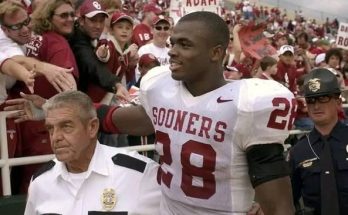Arch Manning is a name that has been on the radar of football fans, analysts, and even casual observers for years. He is, after all, a member of one of the most famous families in the sport—grandson of Archie Manning, son of Cooper Manning, and nephew of NFL legends Peyton and Eli Manning. When Arch Manning, widely regarded as one of the top high school quarterbacks of his class, committed to the University of Texas in 2023, expectations immediately soared to stratospheric levels. This commitment, and the ensuing buzz surrounding it, was arguably the most anticipated signing in recent college football history. The Texas Longhorns, a program that has been searching for its next great quarterback for years, suddenly found themselves with the weight of not just a recruiting coup, but with the hopes of a fan base that had long yearned for national relevance once more.
But, as is often the case with the offspring of legendary athletes, the expectations for Manning were, and continue to be, both a blessing and a curse. Throughout high school, Manning was scrutinized more closely than most athletes at any level, with fans and pundits alike constantly measuring him against the lofty standard set by his family. It didn’t help that Manning’s decision to play for Texas was greeted with an almost immediate wave of pressure. Could he live up to the hype? Would he be able to perform under the spotlight? Or would he eventually fall short, the weight of the Manning name too much to bear?
Even before the 2025 season has officially kicked off, Arch Manning is already proving to skeptics that he is not only capable of handling the pressure but may just thrive in it. In the following analysis, we will explore Manning’s early career, dissect his journey at Texas thus far, and evaluate why the young quarterback has already begun to silence any doubt about his ability to lead the Longhorns into a new era of excellence.
The Weight of Legacy: The Manning Family Name
The Manning name is one of the most revered in the history of football, particularly at the quarterback position. Archie Manning, a former NFL quarterback who played most of his career for the New Orleans Saints, was a beloved figure in the league, despite playing on teams that were mostly mediocre at best. His two sons, Peyton and Eli, each became Hall of Fame quarterbacks in their own right. Peyton, known for his cerebral approach to the game and leadership, won two Super Bowls with the Indianapolis Colts and Denver Broncos. Eli, while often overshadowed by his older brother, proved to be a champion in his own right, leading the New York Giants to two Super Bowl victories over the New England Patriots.
While being part of such a legendary family can certainly open doors, it also creates an intense spotlight that can be suffocating. When it comes to Arch Manning, the weight of these expectations became apparent the moment he picked up a football. However, Arch’s journey has not been about following in the footsteps of his famous relatives—it has been about carving his own path, one that would distinguish him as a quarterback in his own right. This quest for individuality is a significant part of why Manning has already begun to silence critics.
High School Success and the Hype Around Manning
Before coming to Texas, Arch Manning was a highly touted prospect at Isidore Newman School in New Orleans, Louisiana. From an early age, Manning showed immense promise as a quarterback. His combination of arm strength, mobility, and football IQ made him a standout in a state known for producing some of the most talented athletes in the country. While playing for Isidore Newman, Manning led his team to multiple state championships and consistently put up eye-popping statistics, earning him the title of the top quarterback in the 2023 recruiting class.
The hype surrounding Manning reached fever pitch as he became the subject of numerous scouting reports, media appearances, and high-profile recruiting battles. His decision to commit to Texas, a program with a storied history but relatively little recent success, sent shockwaves throughout the college football landscape. On one hand, Manning was joining a program that had the resources, tradition, and ambition to return to national prominence. On the other, he was entering a program that had yet to stabilize its quarterback situation in the post-Sam Ehlinger era. Questions abounded: Would Manning be able to handle the pressure? Could he live up to his family’s legacy? Or would he be another promising recruit who fell short?
Despite the immense pressure, Manning handled his recruitment with maturity and poise, carefully weighing his options before making his decision. His decision to go to Texas instead of more high-profile programs such as Alabama or Georgia reflected a deep confidence in both the program and himself. It was clear that Manning wanted to prove that he wasn’t just another Manning quarterback, but someone who could bring Texas back to the top of college football.
Arch Manning’s Freshman Year at Texas: Silencing Early Doubts
By the time Manning arrived in Austin for his freshman season in 2024, the buzz around his arrival was louder than ever. Texas fans were optimistic about his potential, but there were still lingering questions about how quickly Manning would adapt to the rigors of college football. In the early part of his career, Manning’s play was a mixed bag, which is often the case for highly rated freshmen. There were flashes of brilliance, but also moments where the college game appeared too fast for him.
That said, Manning showed a level of composure and maturity rarely seen in freshmen quarterbacks. Despite the pressure and immense expectations, he managed to impress with his calm demeanor on the field and his ability to read defenses. He did not enter the season as Texas’s starting quarterback, but by midseason, it became clear that he was the future of the program.
In the games he played, Manning showcased his ability to perform in clutch situations. Whether it was leading the Longhorns to a dramatic victory or executing a game-winning drive, Manning’s poise was undeniable. His statistics might not have been overwhelming, but his impact on the game was clear. He took control of the offense and demonstrated an ability to learn quickly from his mistakes. More importantly, Manning showed that he was a player who could shoulder the weight of the Longhorns’ quarterback position with grace and confidence.
Offseason Development: Continuing to Improve and Silence Doubts
As the 2025 season approaches, Manning has worked tirelessly to improve on his freshman year. He has spent countless hours in the weight room, on the practice field, and in film sessions, refining his mechanics and his understanding of the game. Manning’s offseason work has been widely praised by coaches, teammates, and analysts alike, all of whom have noted his incredible work ethic and dedication to his craft. His growth over the offseason has been evident in his increased leadership on the field, his growing comfort with the playbook, and his newfound ability to handle the pressures of being the face of a storied program like Texas.
Moreover, Manning’s development has been aided by the coaching staff’s clear commitment to maximizing his potential. Steve Sarkisian, Texas’s head coach, has worked closely with Manning to refine his decision-making process and expand his skill set. With Sarkisian’s offensive system, which emphasizes both the passing game and quarterback mobility, Manning has the opportunity to develop into a complete quarterback, capable of thriving in a variety of situations. As a result, Manning enters the 2025 season with a higher level of maturity, confidence, and understanding of the game than ever before.
Why Arch Manning is Silencing Skeptics
As the 2025 season approaches, many of the doubts that once surrounded Arch Manning have already started to dissipate. The young quarterback’s growth as both a leader and a player has become evident, and he is now widely regarded as one of the top quarterbacks in the country. His ability to handle the pressure of being a Manning, combined with his natural talent and work ethic, makes him a formidable player who is capable of taking Texas back to the top of college football.
Critics who once questioned Manning’s ability to live up to his family’s legacy are now starting to acknowledge that he is not simply following in the footsteps of his uncles and grandfather. Arch Manning is creating his own legacy—a legacy built on his own hard work, talent, and leadership. And as the 2025 season draws near, it is clear that Arch Manning is not just ready to silence his skeptics, but to make his mark on the game in a way that will leave a lasting impact on college football.



